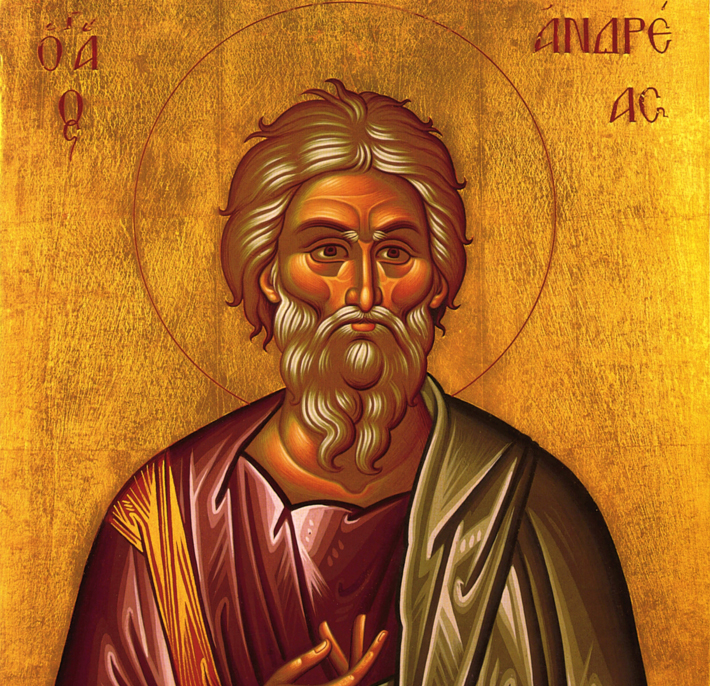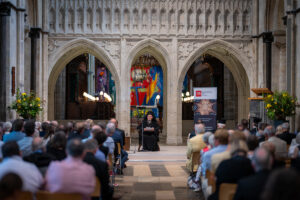A radiant common Liturgy of the Ecumenical Patriarch and the Patriarch of Alexandria – Pope Francis’ Message was read on the Throne Day of the First-Throned Church of Constantinople
* * *
In a solemn atmosphere, the Ecumenical Patriarchate honored the memory of its founder, St. Andrew the Apostle. Today, Saturday, November 30, the Ecumenical Patriarch Bartholomew celebrated the Patriarchal common Liturgy. It was concelebrated by the Pope and Patriarch of Alexandria Theodore II, with the participation of the Hierarch of Crete, Irenaios, Makarios of Aneon, Theodoretos of Laodicea, George of Guinea of the Patriarchate of Alexandria, Athenagoras of Belgium, Damaskinos of Kydonia and Apokoronos, Nathanael of Kos and Nisyros, Dionysios of Zakynthos, from the Church of Greece, Athenagoras of Kydonia, Myron of New Zealand, and Chernigiv and Niznas Efstratios, from the Church of Ukraine.
During the course of the Divine Liturgy, the Ecumenical Patriarch Bartholomew ordained to the rank of deacon Vasilios Grigoriadis, the son of a priest of Constantinople, giving him the name of Barnabas.
During the Divine Liturgy, a delegation of the Church of Rome was represented by Cardinal Kurt Koch, President of the Pontifical Council for Christian Unity.
Praying together also were the Hierarchs of the Throne, Archbishop Anthidonos Nektarios, Commissioner of the Holy Sepulcher in the City, Metropolitan Chrysostomos of Dodoni, Metropolitan Michael of Lutsk and Volyn from Ukraine, and clergy, monks and nuns from Istanbul and from Greece.
Also present were the Deputy Foreign Minister of Greece, Mr. Antonios Diamataris, representative of the Greek Government, the Deputy Foreign Minister of Ukraine, Mr. Vasyl Bodnar, representative of the President of the country, Mr. Ioannis Amanatidis, a Member of the Greek Parliament from the official opposition party of Greece, representatives of the Christian communities of the City, Archons Offikion of the Great Church of Christ, the Secretary General of Public Diplomacy, Religious and Consular Affairs, of the Ministry of Foreign Affairs of Greece, Kostas Alexandris, Ambassador Eleni Vakalis, Deputy Head of the Embassy of Greece in Ankara, the Consul General of Greece in the City, Georgia Sultanopoulou, diplomats of many other foreign countries accredited to Turkey, Greek parliamentarians and Members of Parliament, students of the Hellenic community schools, and many believers from Istanbul, as well as from Greece and other countries abroad.
The homily was proclaimed by the Metropolitan Makarios of Gortyna and Arcadia.
After the dismissal, the Ecumenical Patriarch addressed the official delegation of the Roman Catholic Church, noting that its presence at the Phanar, on the occasion of the Feast of the Holy Apostle Andrew the First-Called, founder of the First-Throned Church of Constantinople, in the context of the established tradition of the exchange of delegations on the Feast Days of the two Churches, “bears witness to the bond of peace and of love, maintaining us in the unity of the Spirit (cf. Eph. 4:3), and constituting a symbol of our entire common desire for the restoration of complete communion between our sister Churches.”
“As one of the pioneers of the establishment of this fine custom of commemorating the memory of the Apostles Andrew and Peter, the brothers and founders of our Churches, the late Metropolitan Meliton of Chalcedon, said that this is not ‘a static act of repetition, but a new reassessment, a dynamic advancement and deepening in the progression towards the ultimate mystery of the Church,’ which ‘complements and illuminates both the theological dialogue and all other manifestations of our brotherly relations,’ highlighting ‘the divine dimension of the whole undertaking of unity’ [Chalcedonia (Athens, 1999), 435].”
His All-Holiness recalled the words of the late Georges Florovsky, one of the most important theologians of the 20th century. This year marks 40 years since his death, an anniversary commemorated by the Ecumenical Patriarchate with the organization of an international theological conference in Istanbul. He said that “all Christians belong to this spiritual space. The East and the West are not independent, self-contained and self-interpreting units; they cannot be understood by themselves, since they having a common past and come from a common tradition, which has gradually failed and broken down.”
“According to Father Florovsky, ‘the tragedy of division is the greatest and most critical problem in Christian history’ [“Patristic Theology and the Ethics of the Orthodox Church,” in Themes of Church History (Thessaloniki, 1979), 34]. The commemoration of the common Christian heritage and the awareness of the tragedy of the division is a constant impetus to continue the struggle to restore lost unity.”
The Ecumenical Patriarch then expressed his satisfaction at the fact that the Joint International Committee on Theological Dialogue between the Roman Catholic Church and the Orthodox Church, which has been working for 40 years, has made progress on the discussion of the important text on “Primacy and Communion in the Second Millennium and Today.”
“We now consider an important dimension of the dialogue of love and truth to be ‘just ecumenism,’ that is, the utilization of the rules and other canonical provisions of our Churches in seeking agreement at the level of doctrine, which has been at the heart of our theological dialogue to date. The importance of canon law for the further progress of the theological dialogue between our two sister Churches is also confirmed by the Ravenna text: ‘In order to have full ecclesiastical communion, there must also be, between our Churches, mutual recognition of their canon laws of their diversity’ (§ 16). As we had the opportunity to emphasize the past September in Rome in our Observations at the 24th International Conference of the Society of the Law of the Eastern Churches, we should not ‘treat the rules’ only as ‘boundaries,’ again in the famous phrase of Father Georges Florovsky. We emphasized that the common canonical tradition of the first millennium functions ‘as the theoretical and practical framework, which complements our long-standing dialogue of truth and love, our commitment to always speak the truth in love’ (cf. Eph. 4:15).”
“A few days after the day of the Observations, our brother Pope Francis, whom we had the privilege of meeting and embracing for awhile in the Vatican, agreed with our position, stressing that the theological dialogue between the two sister Churches has ‘a canonical dimension, as ecclesiology finds its expression in the institutions and laws of the Churches. Therefore, it is clear that canon law is not only a facilitator of ecumenical dialogue, but also a vital dimension of it.’ And the Pope reminded us that our present theological dialogue ‘seeks precisely a discussion of the primacy and conciliarity and of their relationship to the service of the unity of the Church … on the basis of our common canonical inheritance of the first millennium.’”
Special mention was made by His All-Holiness to Pope Francis’ recent move to donate a fragment of the holy relics of the Apostle Peter to the Ecumenical Patriarchate.
“The dialogue of truth in the ‘bond of love’ is enriched, deepened and strengthened by the ‘ecumenism of the saints.’ As our dear friend, His Eminence Cardinal Kurt Koch, points out, ‘the ecumenism of the saints is an excellent foundation for dialogue between the Churches […] This is extremely important, as the veneration of relics can help the faithful engage actively in the dialogue. It is really nice for the leaders of the Churches to meet, but it is equally important for the body of believers to do the same.’ For this reason, we were strongly moved when we were informed, last June, during the Throne Feast of the Church of Rome, that His Holiness, our brother Pope Francis, had spontaneously given us a fragment of the holy relics of the Holy Apostle Peter. However, in this prophetic ecumenical point, we can find multiple meanings. The coming of the relics of the Holy Apostle Peter to the See of the Ecumenical Patriarchate of Constantinople was a blessing in itself, as the Apostle Peter is a prominent figure of Christianity, as an Apostle of Confession, a witness of the Resurrection and as sign of hope for all Christians. This gift of Pope Francis is a new milestone in bringing him closer to us. As His Holiness wrote in his brotherly letter to Our Humility, his intense desire was that ‘the fragments of the relics of the Apostle Peter would be placed near the relics of the Apostle Andrew, who is honored as the patron of the Church of Constantinople.’ The fact that the brothers Peter and Andrew were reunited through their sacred relics urges us to continue with greater emphasis and hope on the path to unity.”
Concluding his address, His All-Holiness asked Cardinal Koch “to convey the warmest brotherly greetings and gratitude of Our Humility to His Holiness Pope Francis. May the Almighty and All-Merciful God, through the blessings of the Apostles Peter and Andrew, bless and strengthen our common efforts to restore complete communion between our two sister Churches.”
Then Cardinal Kurt Koch read a message in English from Pope Francis of Rome, expressing his warmest wishes to the Ecumenical Patriarchate for the feast of its patron, the Holy Apostle Andrew, and referred to the importance of the official theological dialogue between the two Churches, which this year is over forty years old, as well as to the important steps taken during this period.
“The quest for the restoration of full communion between Catholics and Orthodox is not confined only to theological dialogue, but also takes place through other channels of ecclesiastical life. Our relationships are mainly cultivated through authentic gestures of mutual respect and appreciation (Rom. 12:9). Such actions demonstrate a common faith in the word of our one Lord Jesus Christ and the willingness to remain together in His love (John 15:10). This charity is a fruit of the Holy Spirit (Gal. 5:22) and a sign of genuine Christian life (John 13:35). In addition, aware of the one baptism in which we are reborn, the same faith renews us and the one Holy Spirit who guides us (Eph 4:4-5), our closeness grows and intensifies each time we pray for one another (Jas. 5:16), and we pray together as brothers (Matt. 18:19-20). Finally, our relationship becomes fully mature when, in obedience to the commandment of the resurrected Christ, we preach the Gospel to all creatures and heal the sick (Mark 16:15-18), with Catholics and Orthodox working together to proclaim the good news and to minister to those in need. The Catholic Church and the Orthodox Church have already embarked on this very promising journey, as testified by our joint initiatives. I also believe that at the local level, we will all be increasingly supporting the daily dialogue of love and life in common spiritual, pastoral, cultural and charitable work.”
Then the address of the newly ordained deacon Barnabas was held at the Eugenides Auditorium; he expressed his gratitude and devotion to His All-Holiness.
Then the Ecumenical Patriarch granted a special audience to an official delegation of the Eparchial Synod of the Church of Crete, under Archbishop Irinaios, in order to express their good wishes for the Throne Feast of the Mother Church and the respect and love of the faithful people of the island for the institution of the Ecumenical Patriarchate and the person of His All-Holiness.
In the afternoon, the Ecumenical Patriarch welcomed the Deputy Minister of Foreign Affairs of Ukraine, Mr. Vasyl Bodnar, as well as Mr. Rostyslav Pavlenko, a member of Parliament and advisor to former President Poroshenko. They were accompanied by the Consul General of Ukraine in Istanbul, Oleksandr Gaman, and their associates.







